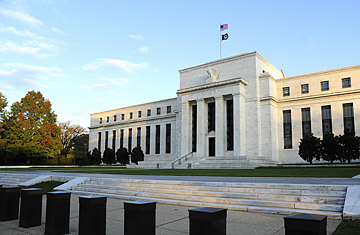
Federal Reserve Building in Washington, DC.
Current Economic Conditions
Federal Reserve District
Federal Reserve Bank of Minneapolis
45 pages
The Gist:
The Federal Reserve's latest survey of regional economic activity — more commonly known as the "Beige Book" — offers a collection of anecdotes from market experts, economists, "key business contacts" and reports from Bank and Branch directors all over the country. Published eight times per year, the latest Beige Book will be used in the upcoming Dec. 16 monetary-policy meeting, when the Fed will determine whether to cut interest rates.
Highlight Reel:
1.Manufacturing and Labor:
When it comes to automotive parts and major equipment in New England, folks ain't interested. Companies there reported double-digit sales declines since last winter, with some firms describing the market as "the worst they can remember." Nearly half of the manufacturers surveyed said they expect their profits to decline through the end of 2009. "The outlook," the Book notes, "is pessimistic." One Boston respondent told Fed officials that the economy's "bearish mood" has even spread to the higher-education sector. Staffing centers are gloomy on the East Coast; says one contact,"Everybody's spooked. There's no hiring going on at all." Even so, positions for engineers, programmers, health care personnel and IT professionals have remained difficult to fill. (In other words, go into those fields, people).
2. Tourism and Travel:
California and New York — home to the country's two largest cities — both suffered dramatic declines in the number of visitors this fall. Hotel revenues in Manhattan plummeted in November, as did Broadway ticket sales. Atlanta, one of the nation's busiest hubs, experienced a drop in business travel. So too did Silicon Valley, which reported an increase in canceled corporate meetings. Restaurants in San Francisco are struggling as well; some predict they will close their doors completely in the new few months if conditions don't improve. The only upbeat tourism officials around are those in Washington D.C., who anticipate "record attendance" for the upcoming Presidential inauguration and a subsequent boost in hotel and restaurant profits.
3. Agriculture and Construction:
Blame Mother Nature, not the economy, for delayed harvests in the Richmond, Chicago and Minneapolis Districts, all of which experienced unusually wet weather. Corn farmers in the Midwest are still feeling the aftershock of a Nov. 1 bankruptcy in South Dakota (one of the nation's largest ethanol producrs). A global drop in cotton demand hurt the region's cotton farmers, who saw both a decline in prices and one of the smallest harvests in 25 years. Homebuilders in the Sixth District, which includes Alabama, Florida and Georgia, noted historically high inventory numbers, despite Florida's modest gains in real-estate sales last month. "On a bright note," the Fed describes construction companies in Texas as "acting orderly and pragmatically, just waiting for things to bottom out" and "not behaving in a panic mode."
4. Retail and Services:
Nationwide, retailers experienced flat or declining sales, even as stores introduced bargains and layaway programs for people unwilling or unable to buy on credit. A large chain near New York credited the region's unseasonably cold weather for relatively decent sales of outdoor and winter apparel in November, while the only retailer to report an increase in sales in the Fourth District, which includes Ohio and Kentucky, was a national discount chain. A domestic car dealer in West Virginia told the Fed his average sales have gone from 250 cars per month to just six in November.
The Lowdown:
Americans looking for a morale boost should look elsewhere. The first sentence of the report pretty much says it all: "Overall economic activity weakened across all Federal Reserve districts." But the country can take some small comfort in knowing that businesses in each of the 12 districts — from Boston to Dallas to Kansas City — are all suffering. As the ole saying goes, misery loves company and, evidently, there are plenty of miserable companies to go around.
The Verdict: Toss
